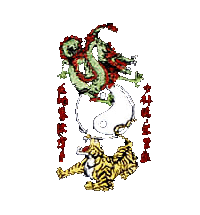| Ten-Chi Kenpo
tenchikenpo.org |
The Art and History of Master Norman Armstrong
His Teachers and Influences |
||||||||||||||||||||||||||

|
Ten-Chi Kenpo (The Law Of Heaven And Earth Fist) is a contemporary Martial Art whose roots can be traced to the Aiken Temple in Japan, the Shao-Lin and Wu-Tang monasteries in China. Ten-Chi Kenpo was formulated by Kyoshi Norman Armstrong during the 1970's, and later confirmed by the president of the United Federation Of Martial Artists Nick Cerio in 1981. This occurred when Hanshi Cerio awarded the rank of Godan (5th degree black belt) to Kyoshi Armstrong. I. Contemporary Kenpo Contemporary American Kenpo, as practiced
in the United States comes from one basic source. That source is James Masayoshi
Mitose, who introduced the form of Kosho-Ryu Kenpo-Jiu-Jitsu to Hawaii in 1936. Today, contemporary Kenpo has three major
organizations that govern its techniques and ranking, and promote some form of Mitose's Kenpo.
II. Ten-Chi Kenpo Ten-Chi-Ryu Kenpo-Karate (The Heaven and Earth School of the Chinese Hand) is a contemporary martial art whose roots can be traced back to the Aken-kai temple in Kyushu, Japan, and the traditions of the Shao-Lin and Wu Tang templesin China. Uniquely, it is a combination of both Okinawan and traditional Chinese forms and technques. It incorporates the idea of Yin and Yang, of positive and negative, as a core concept in its techniques of mind and body. Philosophically, Ten-Chi represents the duality of all existing things; the interaction of two complementing halves, as in Yin and Yang, Night and Day, Hard and Soft, and Mind and Body. III. About the Founder Kyoshi Armstrong was born in New York City in 1938 and began his
martial arts training in the Shoto-Kan system in 1957, while
stationed in Japan during his service in the U.S. Air Force. He returned to the states and continued his studies in various
styles such as, Shorin-Ryu, Tang So Do, Kajukenbo, and Shuri-Ryu, before relocating to Boston in 1970, at the rank of Shodan.
On the weekend of February 16-17 roughly 50 members of the Ten-Chi Kenpo family convened in Ontario California. Their aim was the consideration of Master Armstrong for an advancement in rank. While only the six most senior members technically made the decision, it was in an open ceremony that all present witnessed. It seemed entirely fitting that the very center where Norman so often taught should be the hall chosen for the event. A Vietnamese Buddhist priest and an assisting nun chanted and sanctified the room. A prayer was offered to the assembly for health. A statement addressing the request was read and a vote taken. The Senior practitioners voted 6-0 that Master Armstrong be advanced two degrees rather than one. Ranking student Gary Rooney smudged the presentation belt with sage and it was passed hand to hand among all of the uniformed students, coming finally to Elliott Edwards the next ranking Dan who presented it to Shihan. Click here for the text of the promotional statement Click here to see photos from the celebration 50th Anniversary Commemoration - by Elliott Edwards, February 2007 I returned recently from the West Coast, it was a short trip meant to further the transmission of our martial art. The trip coincided with Master Norman Armstrong's 50th anniversary as a practitioner of Asian fighting arts. He began in Yokohama in 1957, I watched him teach 2 classes last Thursday. We have been connected through the training for well over 30 years. As we sat together talking one evening, I wondered how many people understand in the slightest degree what constancy in anything for a half century requires. The opportunities put aside, the slights overlooked. Respect is earned. Across years and distance, Norman Armstrong has my utmost respect. Happy Anniversary, Sensei. 
Click here to see photos from the celebration Norman N. Armstrong
|
|